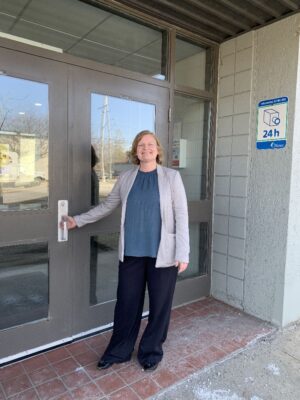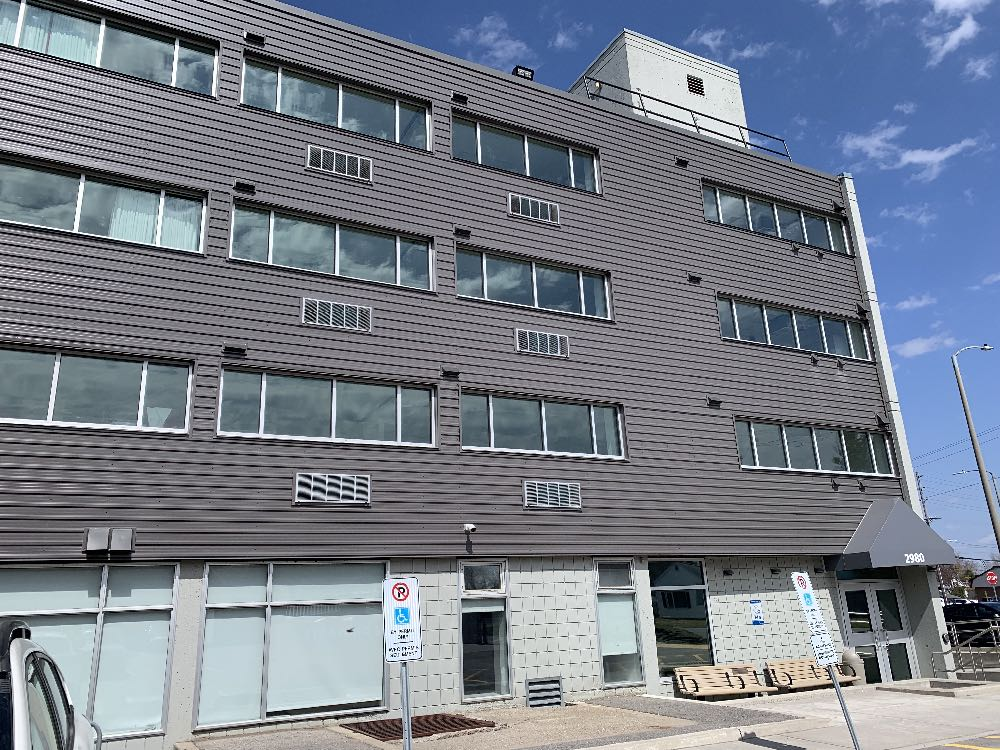Cornerstone Housing for Women’s emergency shelter has successfully moved from its unsatisfactory space on O’Connor Street to a purpose-equipped building on Carling Avenue.
The move immediately increased capacity by 145 per cent—from 61 to 150 beds—also vastly increasing its capacity for services such as case management, counselling, health care and laundry.
The process began in the last week of April. First, all 61 residents of O’Connor St moved. They were followed by 89 more referred from the city’s social distancing and overflow centres who were moved in small groups. Another 15 spaces have been reserved as overflow, to be used when other city shelters are full.
The city operated a family shelter at the location, 2980 Carling Ave., for 20 years. After the city leased a former retirement residence on Corkstown Road and transferred families, it offered the building on Carling Ave to Cornerstone. As it did at O’Connor St., Cornerstone will operate the shelter in a building owned by the city.
The city has seen an unprecedented demand for shelter services, Paul Lavigne, director of the city’s housing services says. “Cornerstone is a key community partner that is helping to ensure women experiencing homelessness are provided with the needed support to stabilize and obtain long-term housing.”

Kate Jackson, Cornerstone’s interim executive director, notes that shelter services have been at the heart of its mission, mandate and values for 40 years. A community ministry of the Anglican Diocese of Ottawa, the shelter began in the church hall at All Saints Sandy Hill.
Along with its many advantages, the new space presents new challenges to Cornerstone. Its community kitchen has gone from preparing 300 meals a day last fall to 1,000 daily at the end of May.
This when food insecurity has been like no other time, including the COVID period, Amber Bramer, Cornerstone director of communications and development says.
In addition to full meal service for 2980 at Carling Ave. the community kitchen supplies the supportive housing residents at the new Eccles St. location as well as Booth St. and some at Princeton Ave.
Even though the Princeton residents have cooking facilities, some can’t afford to buy the food. They can use the food bank only once a month, so they end up falling back on the community kitchen. Water damage to the kitchen at MacLaren Residence created the need for temporary service to another 20 residents.
Fundraising to support the expanded shelter as well as the supportive housing is a continuing challenge since the loss of about $1 million in government funds last year.
There is a standing need to raise $1.5 million every year in the private sector—$1 million to support the shelter, the rest for supportive housing. There is about $250,000 left to raise in the current campaign.
A 40th Anniversary “over the decades” garden party at the home of the Irish ambassador is scheduled for June 9. The fundraiser is an annual fixture on Cornerstone’s calendar.
Bramer says corporate sponsors have stepped up. The Taggart Parkes Foundation provided significant support for the garden at Eccles St. IKEA provided furnishings and bedding. Both are new supporters. The Home Depot, a past donor, returned to help with Eccles St. And the Tides Foundation contributed to the community kitchen.
Both individual donors and corporate partners are not able to be as generous today as they were during the campaign for the Princeton Ave. project in 2018, Bramer says. She thinks it has a lot to do with inflation, particularly the rising cost of food and gasoline.


Week of Prayer for Christian Unity annual service to be celebrated at Saint Paul University on Jan. 22